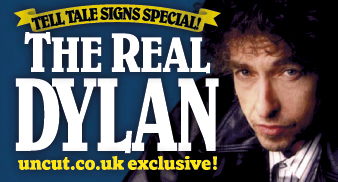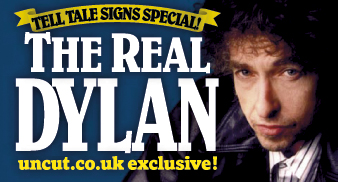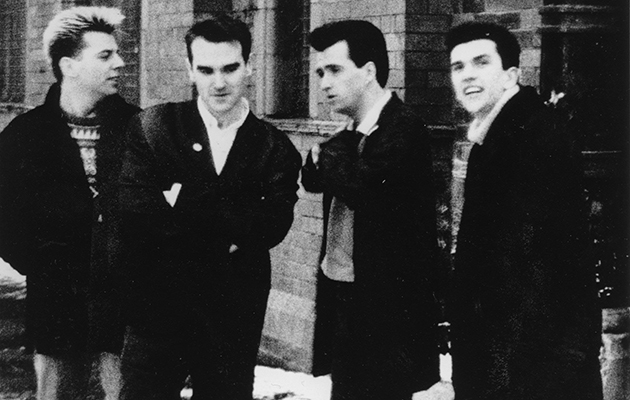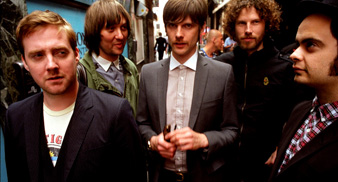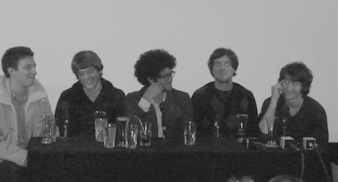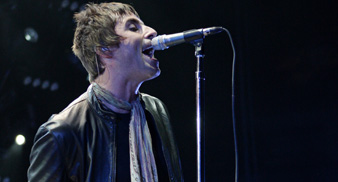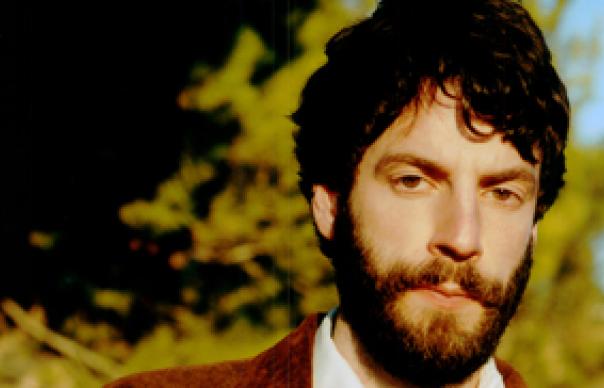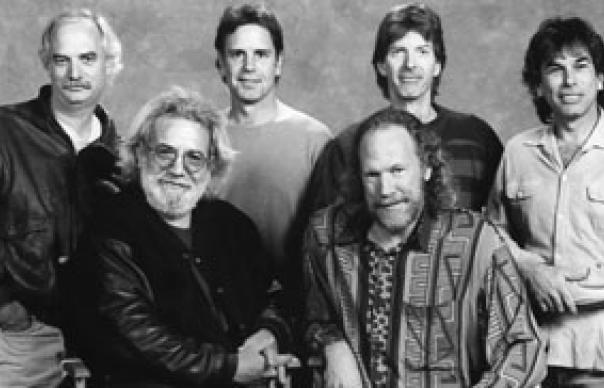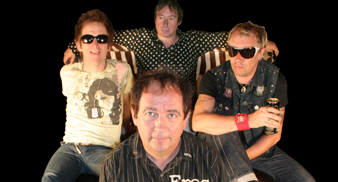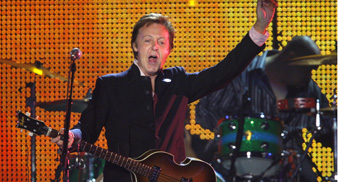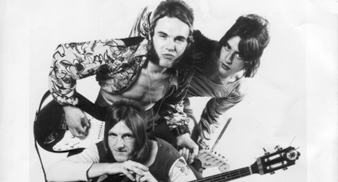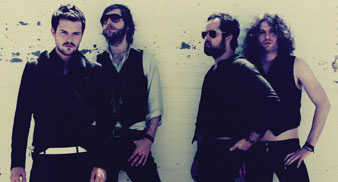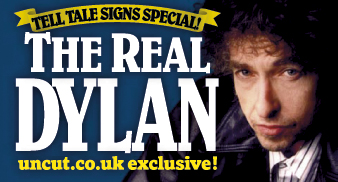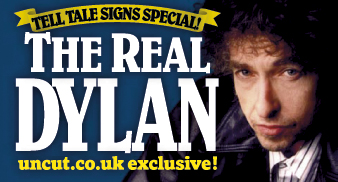BOB DYLAN SPECIAL: The Complete Tell Tale Signs
In this month’s issue of Uncut, we celebrate the release of Tell Tale Signs, the Bootleg Series Vol 8, Bob Dylan’s astonishing 2 and 3CD collection of unreleased material from 1989-2006.
We spoke to the musicians, producers and crew who worked with him during this period. And now, here’s your chance to read the full, unedited transcripts of those interviews.
Today, we present Oh Mercy and Time Out Of Mind engineer Mark Howard, while full interviews with Don Was, Daniel Lanois, Jim Keltner and others will follow in a further ten parts in the coming month. .
You can read previous transcripts by clicking on the side panel (right).
Next one up tomorrow (October 9)!
***
MARK HOWARD
An engineer and producer for everyone from Tom Waits to Harold Budd. The other engineer on 1989’s Oh Mercy, along with Malcolm Burn, Howard returned for 1997’s Time Out Of Mind…
OH MERCY
When we started on Oh Mercy, because Dylan and [producer, Daniel] Lanois hadn’t met before, and didn’t have a working relationship. It was slightly uncomfortable for the first two weeks. Dylan was being a bit snotty, and Dan has this ability to be over-excited about things. That’s how Dan likes to work sometimes: he hypes people on their performances, and that makes them excited too, and then usually it brings out even better performances. Well, that didn’t work with Dylan. So it took a little smoothing out. If you’ve read what Dylan says in Chronicles about it, that’s pretty close to what happened.
For the first two weeks, Bob was just strumming, not making chords, just kind of sloppily playing, and Dan was politely putting up with it: “Yes, yes, that’s okay.” Dan would try to get things out him. He’d say, “Oh, we did this mix earlier this afternoon – ” And Dylan would cut in, “I don’t even wanna hear it. I only wanna hear stuff done at night.” He had this night rule. I later noticed, on Time Out Of Mind, that kind of night rule became a theme on that record, too. You’d roll in about four or five o’clock, and then do the whole evening thing. And we’d get a lot done during those periods.
But for that first two weeks on Oh Mercy, everything we did, he wouldn’t accept it, and it was very difficult. During those first weeks, he didn’t even acknowledge that I was in the room with him, or say my name. I’d be sitting on the floor in front of him, to put the microphone in front of his mouth –and he would turn the other way. So, I’d have to move the microphone stand put it over there now – and as soon as I put it there, he’d turn back the other way. So I’m sitting there on the floor, having to move this stand to wherever he would turn, and it was like he was almost doing it on purpose, it was really bizarre.
But there came this one point when Dan finally really lost it with him, and had a bit of a freak out. He just wanted Dylan to smarten up, and it became – not a yelling match, but it became uncomfortable in the studio. So Malcolm [Burn] and me, we walked out and let them sort it out. And then, when we got back, from then on, Dylan was just really pleasant to work with. He started calling me by my name, and I kind of hit it off with him.
We were doing the record in this Victorian mansion in the garden district of New Orleans, and I had a bunch of Harleys in the courtyard, I was a collector, and he would come up. He said, “Y’know, ya think you could get me one of those?” So I got him this 1966 first year Shovelhead Harley Davidson, and he’d go out riding it every day, so on that level we kind of hit it off.
Dylan would go out for a ride on his motorcycle every day, and I’d help get him up and running, and he’d take off. But one day, I heard him stall just around the corner. So I ran around the corner to see, and he’s sitting there, on the bike, staring straight ahead. And there are already three people gathered around the front of the motorcycle, saying, “Bob, can we have your autograph?” And he just sat there like they weren’t even there. I ran up and said, “Hey, c’mon guys, leave the guy alone.” He just continued to sit there and stare straight ahead like they weren’t even there. So we got the bike fired up and – bang – he took off. He was living in California in those days, and there was no helmet law in California, but there were in New Orleans. He’d come back from these rides and he’d say, “The police are really friendly around here, they’re all waving at me.” I’m like, “They’re waving at you because you don’t have a helmet on, and they’re telling you to stop!”
After that first, kind of uncomfortable few weeks, I think the bike actually helped him on that record. He’d go for a ride and think about what was going on, and I think he could see the point of view of where Dan was trying to go with the record. Dylan was fighting it, but he kind of let it go, and that’s where Oh Mercy ended up going.
Dylan wasn’t sure what direction Dan was trying to take these tracks in, and it was later on that he discovered that he was liking the vibe of what the songs were becoming. And by the end, I think he was really enjoying it. The way Bob works is, he kind of writes on a typewriter, so he has no idea where these songs lie, in what key they live in, what tempo – anything of that. Musically, there’s no chords written. So it’s like, he’ll say, “I got this song, and maybe this is how it goes,” and you try a couple of different versions of it in different keys, and he just finds where it sounds best, where it sounds best for his voice, where it’s comfortable. And that’s usually the open you end up going with.
So, on Oh Mercy, I’m not sure if he had an actual sound in his head to begin with. But he had actually recorded this whole record before it came to us. With Ron Wood. There’s a whole version of Oh Mercy that was recorded with Ron Wood already. But I think Dylan had maybe decided he didn’t like what had happened.
On Oh Mercy, Dan, Malcolm and I had just come out of making a record with the Neville Brothers [Yellow Moon], so, when we were putting a band together for Bob, we used a couple of member from the Neville brothers as rhythm section. And we invited Mason Ruffner in, he was kind of a rockabilly, guitar slinger, and Bob had really liked his records, as he told him, so that worked out pretty good. And then, because we had been going to this club, The Maple Leaf Club, we had been checking out this band called Rocking Dopsie, who was kind of a scrubboard player, and we thought that band would work great on a couple of tracks, so we got them in. They had this really amazing saxophone player, Johnny Hart, who was blind, and he’d play the saxophone against the wall, he’d get this beautiful tone. So we got them in, and they’re playing – and Dylan, right in front of them, he just goes, “Where’d you *get* these guys from?” A lot of the tracks were built around a smaller group, though, just Bob, Dan and Malcolm, built off a loop or an 808 drum machine pattern, tracks like “Most Of The Time” were built off those guys and machine loops.
The one song that really sticks out for me was “Man In The Long Black Coat”. Malcolm Burn had originally been hired to be the engineer on those sessions, but he was also a musician, and he ended up playing more than he was engineering on a lot of Oh Mercy, and I was the one who was left actually recording, and I was pretty green in those days. I’d just come from Canada, and the Neville Brothers record had been the first big record I’d really worked on. I was 21-years-old, and I hadn’t done much recording, I was an assistant, and so ended up wearing a lot of hats as the guy who kind of did all the other stuff, from finding location, building the studio to doing the banking. And now, with Malcolm playing a lot, I was suddenly recording it, too. Thrown into the hot seat.
I really remember recording “Man In The Long Black Coat”. Malcolm was playing a Yamaha DX7 that Brian Eno had mastered – he had all these sounds built in. Brian had come in on the Neville Brothers record and given us a bunch of sounds for the DX7, and one of the sounds was this crickets sound. Actually, on the Neville Brothers’ Yellow Moon record, I’d found this six-storey apartment building on St Charles Avenue where we lived and recorded, and they have these bugs in New Orleans, cicadas, that make this high-pitched sound. When Brian came in with his cricket sounds, he would play this melody, and then these cicada bugs would repeat it back. It became really creepy. He would do it again, and they’d do it again, and he’d make the melody a little harder, and they would follow it, and so we were like, “Brian Eno is communicating with the insects, oh my God.”
So, anyway, for “Man In The Long Black Coat”, Malcolm just jumped on the keyboards and started playing these crickets, and it made it really haunting, and, y’know, we did a couple of takes and, bang, that was that masterpiece done. That was the first time ever that hairs went up on my arm while I was recording music, it was magical.
On the Oh Mercy sessions, it was kind of roll up your sleeves, go to work, we’ve got a band in, and bang, bang, bang. Later, on Time Out of Mind, there would be times when he would tell a lot of big stories, hours of talking, but on Oh Mercy, we were just getting to know him, and he was there to get his work done. Out of everybody I’ve worked with, Dylan is the most dedicated and focused writer. He would *always* be working o his lyrics. He’d have a piece of paper with thousands of words on it, all different ways, you couldn’t *read* it, it was impossible, because there’d be words going upside-down, sideways, just words all over this page. You couldn’t make heads nor tails of it. And he would look at it, and he’d pull from it. I never saw him eat. He only drank coffee and smoked cigarettes, and he’d sit chipping away at the words, pulling words from other songs, putting them in there. I really appreciated his focus on the song itself, how dedicated, and how hard he worked on it.
I always like to have a drawing pad with me, next to the console or whatever, I’m always drawing. And one day, Bob saw it, and he said, “Hey, mind if I use your pad?” Then he goes, “Daniel, you mind if I draw a picture of you?” So Bob scratches out this drawing of Dan, just his head and shoulders, and Dan had a lot of long hair in those days, so he drew this picture that was like this kind of wild Indian, with hair all over him. So he drew it, and it was really pretty cool. But he didn’t sign it.
So, this picture was in my art book, and we had finished the record, and two weeks had passed. And I’m sitting in one day, and there’s somebody at the door. So I go out, and it’s New Orleans, pouring with rain, and I open the gate – and there’s Bob standing there in his hoodie. I say, “Hey, Bob.” And he says, “I’ve decided to sign the drawing.” And he came in, he signed the drawing, and he left.
TIME OUT OF MIND
Dylan was a little more laid back when he came back ten years later. I think he was a little more comfortable with us by that point. Before Time Out of Mind came into play, we had been asked to mix this live show that Dylan had did. It was recorded for the Olympics in Atlanta, Georgia, he played The House of Blues, and they wanted to mix the recording for a Japanese release. And that was where a little bit of the sound of Time Out Of Mind began to become apparent.
On those recordings, I’d mixed the whole live show for them, and on the last song I was mixing, Dylan plays harmonica, and he says, “Hey, Mark, d’ya think you can make my harmonica sound electric on this one?” So I said, yeah, sure, and I took the harmonica off the tape and ran it through this little distortion box, and I played it, and he said, “Wow, that’s great.” So we’re mixing away, and, after he stops playing harmonica, he starts singing into the same mic, and Dylan hears his voice going through this little vocal amp, and he gets really excited about it. “Wow! This is great!” And so I had to remix the whole record, putting this little vocal amp on all of his vocals for the whole show. And that sound became the sound of Time Out Of Mind.
I had a place in Oxnard, California, about an hour north of Los Angeles, a place I’d rented that was kind of a workshop for me and Daniel, we shared it half and half, I’d produce my records, he’d produce his records. Dylan was living in Point Dune, and he’d drive up every day, and he’d tune into this radio station that he could only get between Point Dune and Oxnard. It would just pop up at one point, and it was all these old blues recordings, Little Walter, guys like that. And he’d ask us, “Why do those records sound so great? Why can’t anybody have a record sound like that anymore? Can I have that?” And so, I say, “Yeah, you can get those sound still.” “Well,” he says, “ that’s the sound I’m thinking of for this record.”
That’s how it started, with that sound. But at the same time, Dylan was very interested in Beck. He’d say, “These Beck records are sounding pretty cool. How does he make those records?” So we’d talk about them being loop-based, and playing on top of them, and he’s like, “Yeah, yeah.”
So we originally started off with the idea of making this record sound something like a Beck record. We brought in Tony Mangurian, who’s kind of a hip-hop drummer from New York, his whole thing is computer-based, he loops stuff and builds on top of it. The original idea was he was going to be there at the computer and fit out all these things, and we’d do all this collaging and cut-and-paste.
But when Dylan first came in, we’re already to do this, and he’d say, “Yeah, I’ve got this song,” and he’d go over to the piano, and he’d play just a little bit, then he’d say, “Daniel, whaddaya think of that song?” And Dan goes, “Well, it sounds really great, but I need to hear some lyrics.” But Bob wouldn’t sing any lyrics. Next day, he’d show up, “I got *another* song for you.” He’d play a little bit of piano. “Whaddaya think of *that* one?” Dan would go, “Well – I really need to hear a song.” And it was like he was just *playing* us, you know, really stringing us along.
But then, finally, the next day, he comes in and he plays this song on the piano called “Can’t Wait”.
And this is a *gospel* version of the song. Tony, he hears it, and he just went over to the drumkit and he started playing this groove with him, this kind of hip-hop beat, a real sexy groove, and Bob is hammering out this gospel kind of piano and really singing, and, again, the hair on my arms went up, it was stunning. Luckily, I was recording, and I caught it. He played one verse, and a chorus, and that was it.
We were thinking, Wow. If this is going to be anything like this, this record is going to be unbelievable. And that’s how it all started to drift away from the idea of the computer-based thing.
Then, just as we’re all set to make the record in Oxnard – and we were getting amazing sounds in this old theatre, had all the gear set up, this really incredible atmosphere with 16mm projectors and mirrorballs – Bob says, “Y’know – I can’t work this close to home. I got my family there, I can’t work here. I wanna do it in Miami.” The *furthest* point away, right? So I took most of the gear, all the microphones I was using, these old ribbons from the 1950, a lot of tube microphones, and I threw them in the truck with a bunch of motorcycles, and I drove from LA to Miami over the Christmas break to set up at the Criteria studio.
Criteria is a big, huge, soundstage room, completely white, no vibe, and the room sounds really spitty, it just didn’t sound good at all. So I’d gone from having it made and getting all these great sounds, to really struggling to get a sound. And, you know, there would come a point where there were like 15 people playing in that room at the same time, and the way Bob works is, because he hasn’t figured out the song, each take is in a different key. So, he’s just been doing it in D, and now he’s going to do it in E, and for the musicians, it’s suddenly you have to change the whole map of the chords, and a lot of people can’t just do that straight off. But Dylan kind of expects you to just know it – he knows every chord, and he’s really great at that kind of stuff. So a lot of them just weren’t making the changes.
We’d come back and listen in the control room, and it was all over the place – people are hitting the wrong note, it just sounded so chunky, it was just awful. So Dan said to the musicians, “If you’re not going to make the changes, if you can’t figure it out – just don’t play. That’s the law. Just don’t make the mistake, because we’re only going to get a couple of chances, and you never know if this is going to be the take.”
We’d listen to these takes coming in, and Dan is just standing there saying, “Man, this is so chunky.” And Jim Keltner goes: “Is that West Coast chunky, or East Coast chunky?” And [organ player] Augie Meyers, you know, has polio in one leg, and he’s a really big dude, like six feet tall, and a big guy. He’d be standing right behind me in the control room, and suddenly you’d hear – bang! –I’d feel the floor shaking, and Augie would just have collapsed and fell on the floor. So there was a bit of a theme going on, things were sort of crazy.
I mean, by that point, Jim Keltner is there playing drums, Brian Blade is there playing drums, and Tony Mangurian is there playing drums – three drummers going on at the same time, five guitar players, pedal steel, organ, piano, all these people. Dan had put together a band, and then Dylan had put out the call for these guys like Jim Dickinson, Augie Meyers, Duke Robillard, Cindy Cashdollar. Dylan brought in all these Nashvile people, and I think that made Dan a little mental having all these Nashville strummers strumming, it was a bit too much. As I’m sure Jim Dickinson has said, there were a lot of ingredients in there that you don’t actually hear on the record, because things were filtered down so we could take a cleaner path on some of them.
In terms of the conflict that people have mentioned between Dan and Dylan, what those guys were witnessing was – earlier we were talking about that first version of “Can’t Wait” that was so haunting – well, Dan wanted to get back to that version.
We had recorded three other versions of “Can’t Wait”, which you might hear on this new record that’s coming out. And what we did was, we named the takes, one would be called “Ragdoll”, another one would named “The psychedelic version,” and so on. And those were all us trying to get back to that original version. But Dylan wouldn’t go back to the piano, because we had Dickinson there and Bob wanted his vibe on it.
So we’d done it, recorded it, and Dan would be saying, “You know, those are good takes, but I just gotta get that version, *I gotta get that version*. I gotta get back to that.” But Dylan wasn’t interested, he thought it was a bit throwaway, that it was done, over. And so, Dan, for a few days, he had this technique where, before Dylan would come in, he would work up the song himself, he’d get the song worked up himself – and Dan would sing it, “Can’t Wait”, and he’d kind of be mocking Dylan a little bit, doing the Dylan voice, y’know. And then Dylan would walk in to this, and he’d be like, “What’s going on here? It’s done. Why are you going there?” And then Dylan would just shut down. “Nah, I’m not recording nothing till you figure this out, I don’t even wanna record this record anymore.”
One of the arguments during Time Out Of Mind was this thing about never doing a song the same way twice. Bob actually pulled Tony Garnier, his regular bass player, into the room with Dan at one point. He says, “Tony. Have I *ever* played any song twice exactly the same?” Tony says, “No, Bob, no.” Bob says, “*See*? I don’t *do* that.” And Dan’s like, “Yeah, but that song ‘Can’t Wait…’” Bob’s like, “I did it that way, and I’m never doing it that way ever again. I don’t do anything the same twice.”
So there was a bit of a conflict, where there was a tension between Dan and Bob that got quite uncomfortable. There was a situation where Bob wouldn’t actually talk to Dan for a little while. So Dylan would only talk to me, and then Dan would come to me to tell me what to tell Dylan, and I was like there go-between.
We’d be sitting at the console, and Bob would say, “What’s on that track?” I’d say, “That’s your guitar.” “Great, great, turn it up. What’s on that track?” “Oh, that’s Dan.” He’d whisper, “Take it out, take it out.” The Dan would walk in and he’d say, “Wow, this is sounding great!” And Bob would turn to me, with Dan standing right there, and he’d say, “Did you hear something?” And I’m sitting there, like “Oh, no…” He was kind of playing, but it was intense.
I was working quite hands on with Dylan for a while, doing the vocals. Say on something like “Not Dark Yet” he’d say, “I wanna change this one line,” and I’d say, “Bob, I really love that line, that’s my favourite line, please don’t change it – but if you are, I’ll put it on another track and kind of save it, because you might want to put it back.” And he said, “Really? Well, okay, don’t worry about it.” You know, I’d just try and be really honest with him, about what I thought about lyrics and things, and he kind of appreciated that. But if it was *Dan* who said something like that, Bob was like, “Let’s change it, right away.”
I think Bob’s chosen to produce himself since then maybe because Time Out Of Mind was a co-production with Dan, and he might have though that he’d taken the reins away from Dan a little, that he was producing it more himself, and he might have thought, “Well, why do I need to have somebody else? I know my direction, and I don’t want to have these conflicts with anybody.”
I talked with Don Was, actually, who had also produced a record for Bob [1990’s Under The Red Sky], and he had this funny story. He had finished recording the whole record, and then, on like that last day, Bon announces that he wants to put accordion on. On every song. So sometimes, you have to ask, is the producer going to put up with it and let you do it? Or is he going to say, “Hey, that’s not a good idea.” And, of course, Don lets him do. But at the end of the day, Bob’s got the call, and that’s maybe why he’s chosen his own producing path.
As the end of the Time Out Of Mind session rolled around, though, it was a month or two later, after recording, when Bob reappeared and we ended up finishing the record back in Oxnard in California, and by that point, Dan and Dylan were talking again. That’s where all Bob’s storytelling was done, during the mixing.
Bob would just go off and talk for literally two hours at a stretch. He told these stories about when he was living in New York and how he couldn’t go home because there was a crowd of people in front of his house, he’d have to put out a phone call to spread the word that he was over in the Village so the crowd would go over there and he could get into his house. He had all these stories, and it was amazing to hear it from him. I’d ask him about The Band, how he found those people. “Well, this girl was telling me about these guys from Canada, and I went and checked them out, and they seemed right…” When he wrote Chronicles, some of the same stories were in there, and I had the idea that a lot of these stories he’d had in his mind over the years. It’s amazing the amount of detail, little tiny details, that he remembers. It’s a long voyage he’s been on.
DAMIEN LOVE


